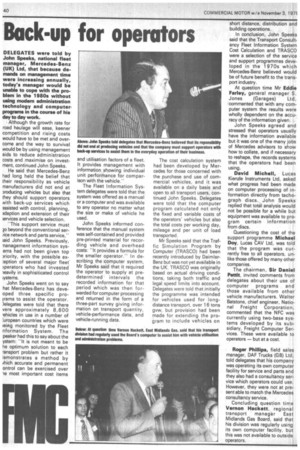Back-up for operators
Page 42

If you've noticed an error in this article please click here to report it so we can fix it.
DELEGATES were told by John Spooks, national fleet manager, Mercedes-Benz (UK) Ltd, that because demands on management time were increasing annually, today's manager would be unable to cope with the problem in the 1980s without using modem administration technology and computer. programs in the course of his day to day work.
Although the growth rate for road haulage will ease, keener competition and rising costs would have to be met and overcome and the way to survival would be by using management aids to reduce administration costs and maximise on investment, continued John Speeks.
He said that Mercedes-Benz had long held the belief that their responsibility as vehicle manufacturers did not end at Noducing vehicles but also that they should support operators Nith back-up services which assisted with control, planning, adaption and extension of their iervices and vehicle selection.
"This support service must 3o beyond the conventional serrice network and parts service," ;aid John Speeks, Previously, rianagement information sysems had not been given top )riority, with the possible ex:eption of several major fleet' )perators who had invested )eavily in sophisiticated control ;ystems.
John Speeks went on to say hat Mercedes-Benz has deveoped three specific proprams to assist the operator. )elegates were told that there vere approximately 8,600 *hides in use in a number of iuropean countries which were iekrig monitored by the Fleet nformation System. The peaker had this to say about the ystem: "It is not meant to be he optimum solution to each eansport problem but rather it emonstrates a method by ihich accurate and permanent ontrol can be exercised over le most important cost items and utilisation factors of a fleet. It provides management with information showing individual unit performance for comparison with the vehicle."
The Fleet Information System delegates were told that the system was offered as a manual or a computer and was available to any operator no matter what the size or make of vehicle he used.
John Speeks informed conference that the manual system was self-contained and provided pre-printed material for recording vehicle and overhead costs: "It provides a formula for the smaller operator.In describing the computer system, Mr Speeks said that it required the operator to supply at predetermined intervals the recorded information for that period which was then forwarded for computer processing and returned in the form of a three-part survey giving information on transport quantity, vehicle-performance data, and vehicle-running data,
The cost calculation system had been developed by Mercedes for those concerned with the purchase and use of commercial vehicles, and it was available on a daily basis and open to all transport users, continued John Speeks. Delegates were told that the computer program calculated not only the fixed and variable costs of the operators' vehicles but also the total costs per working day, mileage and per unit of load transported.
Mr Speeks said that the Traffic Simulation Program by Computer (TRASCO) had been recently introduced by DaimlerBenz but was not yet available in the UK. TRASCO was originally based on actual driving conditions, taking both traffic and legal speed limits into account. Delegates were told that initially the programme was intended for vehicles used for longdistance transport, over 16 tons gvw, but provision had been made for extending the program to include vehicles on short distance, distribution and building operations.
In conclusion, John Speeks said that the Transport Consultancy Fleet Information System Cost Calculation and TRASCO were a selection of the service and support programmes developed in the 1970s which Mercedes-Benz believed would be of future benefit to the transport industry.
At question time Mr Eddie Farley, general manager S.
Jones (Garages) Ltd, .commented that with any computer system the results were wholly dependent on the accuracy of the information given.
John Speeks agreed and stressed that operators usually have the information available but it was one of the many jobs of Mercedes advisors to show how to collate, and if necessary to reshape, the records systems that the operators had been using.
David Michell, Lucas Kienzle Instruments Ltd, asked what progress had been made on computer processing of information directly from tachograph discs., John Speeks• replied that total analysis would not be possible for a while but equipment was available to program certain information from discs.
Questioning the cost of the support programme Michael Day, Lucas CAV Ltd, was told that the program was currently free to all operators, unlike those offered by many other companies.
The chairman, Sir Daniel Pettit, invited comments from delegates about their use of computer programs and those available from other' vehicle manufacturers. Walter Batstone, chief engineer, National Freight Corporation, commented that the NFC was currently using two-base systems developed by its subsidiary, Freight Computer Services. These were available to operators — but at a cost.
Roger Phillips, field sales manager, DAF Trucks (GB) Ltd, told delegates that his company was operating its own computer facility for service and parts and they also had a consultancy service which operators could use. However, they were not at present able to match the Mercedes consultancy service.
Concluding question time Vernon Hackett, regional transport manager East Midlands Gas Board, said that his division was regularly using its own computer facility, but this was not available to outside operators.




























































































































